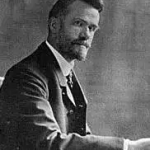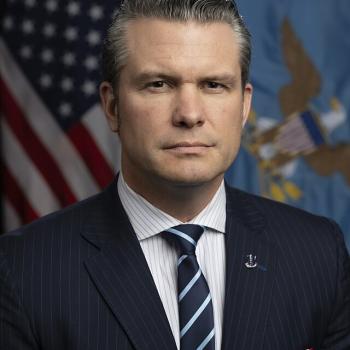Calling out “Calling out ‘American Evangelicalism’”
On January 19 (2016) moderate Baptist writer and editor John Pierce published a column entitled “Calling out ‘American Evangelicalism’” at https://baptiststoday.org/calling-out-american-evangelicalism/ . Pierce is editor of Nurturing Faith Journal—“the signature publication of Baptists Today, Inc.” I know and respect him as a leading spokesman for moderate Baptists—a category in which I place myself.
In my opinion, as a scholar of American evangelicalism and as a proud lifelong evangelical, Pierce’s attack on American evangelicalism is uncalled for and inappropriate. It’s inappropriate because it treats “American evangelicalism” as a homogeneous and monolithic political movement and uncalled for because it is offensive to evangelicals—especially those of us who do not fit its description of American evangelicals as haters.
Here are a few samples of the column’s vitriol toward American evangelicals. First, Pierce says American evangelicalism is “a political movement that simply baptizes hard-right, secular political ideology in some religious varnish.” Then he distances it from “Christianity” saying it has “nothing to do with the life and teachings of Jesus.” Finally, he claims “It is a fear-based, fear-driven, fear-inducing movement” and “a political movement that sees grace and mercy as weaknesses” and in it “raw power is revered over the Fruits of the Spirit.”
Pierce is a Baptist. I wonder if he would be offended by those in many parts of the U.S. and elsewhere who view all Baptists through the lens of Westboro Baptist Church? I lived in Minnesota for fifteen years. According to people who study such things, that state has the lowest percentage of Baptists of any state. Only about three percent of Minnesotans identify as Baptists. There I found myself constantly battling (e.g., through letters to the editors of the two Twin Cities daily newspapers) the common misconception of all Baptists as fundamentalist haters.
As a proud and unapologetic, lifelong American evangelical Christian I am offended by Pierce’s broad-brush, globalizing dismissal of American evangelicalism. I believe it is an example of false stereotyping and even caricaturing. To be sure, there are many people in America who claim to be evangelical who fit Pierce’s description, but there are also many who do not. I have to wonder how familiar he is with “American evangelicalism”—a spiritual and theological movement and ethos that in and of itself is not political.
I am also offended by American evangelicals who claim to speak for all evangelicals and who do attempt to portray it as in lock step with ideological and even partisan politics. The fact is, however, they do not speak for all American evangelicals. I am also offended by the mass media and journalists who have succumbed to the wiles of the self-appointed spokespersons for American evangelicalism who are really fundamentalists and right-wing ideologues and have begun to use “evangelicals” as a label for an extremely conservative, mostly Republican, religious-political bloc.
So who is an “American evangelical?” I have long argued that “evangelicalism” is not a closed or bounded set category. It is a centered set category (like all movements). Historically, theologically, and spiritually it is a trans-denominational movement of mostly Protestant Christians who share belief in the necessity of a personal decision for Christ for authentic Christianity. It is a movement that emphasizes the Bible as supernaturally and uniquely inspired and authoritative for faith and practice. It is a movement that believes salvation comes only through Jesus Christ and his death and resurrection. It is a movement that practices evangelism and social transformation in a variety of ways. Finally, it is a movement that values traditional basic Christian beliefs (“orthodoxy”) such as the deity of Jesus Christ (incarnation), the Trinity (however understood or misunderstood), the need of every person for the grace of God received through faith alone, and the future return of Jesus Christ.
All movements are rightly defined by their prototypes. The prototypes of American evangelicalism are the first and second Great Awakenings, evangelists such as D. L. Moody and Billy Graham, theologians such as Carl Henry and Bernard Ramm, institutions such as Wheaton College and Fuller Seminary, and organizations such as Youth for Christ, the National Association of Evangelicals, and World Vision. Proof that not all American evangelicals fit the “Pierce stereotype” are socially and politically progressive evangelicals past and present such as Mark Hatfield, Jim Wallis, Ron Sider, Tony Campolo, David Gushee and the entire Evangelicals for Social Action organization.
Numerous articles and books have debunked the idea that “American evangelicalism” is a monolithic political bloc devoted to ultra-conservative politics. I recommend to Pierce and others who lump us all together: The Truth about Conservative Christians: What They Think and What They Believe (University of Chicago Press, 2008) by Andrew Greeley and Michael Hout. Anyone who has studied American evangelicalism knows how diverse the movement was and (insofar as it still exists at all) still is.
To those Baptists, such as Pierce (and many others I am acquainted with) who view “American evangelicalism” as a united ultra-conservative political movement I say: Become better acquainted with us. I say the same to the very many Americans who view Baptists as all marching in lock-step with (or at least just a little behind) the Phelps family and Westboro Baptist Church: Become better acquainted with us Baptists, we are not all like that.
I find it highly ironic especially when Baptists lump together and stereotype all evangelicals as politically and socially conservative. Both are spiritual and theological movements, not political ones. I ask them how they would feel if they turned on a television talk show and saw and heard a Catholic or liberal, mainline Protestant spokesperson lumping all Baptists together as Westboro Baptist types? I’m sure they would protest that. Well, I protest the lumping of all American evangelicals together as Religious Right types. We are not. Please be fair. Do not do to us what you would not want done to you.











